
fastfit
FastFit ⚡ When LLMs are Unfit Use FastFit ⚡ Fast and Effective Text Classification with Many Classes
Stars: 183

FastFit is a Python package designed for fast and accurate few-shot classification, especially for scenarios with many semantically similar classes. It utilizes a novel approach integrating batch contrastive learning and token-level similarity score, significantly improving multi-class classification performance in speed and accuracy across various datasets. FastFit provides a convenient command-line tool for training text classification models with customizable parameters. It offers a 3-20x improvement in training speed, completing training in just a few seconds. Users can also train models with Python scripts and perform inference using pretrained models for text classification tasks.
README:
FastFit, a method, and a Python package design to provide fast and accurate few-shot classification, especially for scenarios with many semantically similar classes. FastFit utilizes a novel approach integrating batch contrastive learning and token-level similarity score. Compared to existing few-shot learning packages, such as SetFit, Transformers, or few-shot prompting of large language models via API calls, FastFit significantly improves multi-class classification performance in speed and accuracy across FewMany, our newly curated English benchmark, and Multilingual datasets. FastFit demonstrates a 3-20x improvement in training speed, completing training in just a few seconds.
Our package provides a convenient command-line tool train_fastfit to train text classification models. This tool comes with a variety of configurable parameters to customize your training process.
Before running the training script, ensure you have Python installed along with our package and its dependencies. If you haven't already installed our package, you can do so using pip:
pip install fast-fitTo run the training script with custom configurations, use the train_fastfit command followed by the necessary arguments similar to huggingface training args with few additions relevant for fast-fit.
Here's an example of how to use the run_train command with specific settings:
train_fastfit \
--model_name_or_path "sentence-transformers/paraphrase-mpnet-base-v2" \
--train_file $TRAIN_FILE \
--validation_file $VALIDATION_FILE \
--output_dir ./tmp/try \
--overwrite_output_dir \
--report_to none \
--label_column_name label\
--text_column_name text \
--num_train_epochs 40 \
--dataloader_drop_last true \
--per_device_train_batch_size 32 \
--per_device_eval_batch_size 64 \
--evaluation_strategy steps \
--max_text_length 128 \
--logging_steps 100 \
--dataloader_drop_last=False \
--num_repeats 4 \
--save_strategy no \
--optim adafactor \
--clf_loss_factor 0.1 \
--do_train \
--fp16 \
--projection_dim 128Upon execution, train_fastfit will start the training process based on your parameters and output the results, including logs and model checkpoints, to the designated directory.
You can simply run it with your python
from datasets import load_dataset
from fastfit import FastFitTrainer, sample_dataset
# Load a dataset from the Hugging Face Hub
dataset = load_dataset("FastFit/banking_77")
dataset["validation"] = dataset["test"]
# Down sample the train data for 5-shot training
dataset["train"] = sample_dataset(dataset["train"], label_column="label", num_samples_per_label=5)
trainer = FastFitTrainer(
model_name_or_path="sentence-transformers/paraphrase-mpnet-base-v2",
label_column_name="label",
text_column_name="text",
num_train_epochs=40,
per_device_train_batch_size=32,
per_device_eval_batch_size=64,
max_text_length=128,
dataloader_drop_last=False,
num_repeats=4,
optim="adafactor",
clf_loss_factor=0.1,
fp16=True,
dataset=dataset,
)
model = trainer.train()
results = trainer.evaluate()
print("Accuracy: {:.1f}".format(results["eval_accuracy"] * 100))Then the model can be saved:
model.save_pretrained("fast-fit")Then you can use the model for inference
from fastfit import FastFit
from transformers import AutoTokenizer, pipeline
model = FastFit.from_pretrained("fast-fit")
tokenizer = AutoTokenizer.from_pretrained("sentence-transformers/paraphrase-mpnet-base-v2")
classifier = pipeline("text-classification", model=model, tokenizer=tokenizer)
print(classifier("I love this package!"))Optional Arguments:
-
-h, --help: Show this help message and exit. -
--num_repeats NUM_REPEATS: The number of times to repeat the queries and docs in every batch. (default: 1) -
--proj_dim PROJ_DIM: The dimension of the projection layer. (default: 128) -
--clf_loss_factor CLF_LOSS_FACTOR: The factor to scale the classification loss. (default: 0.1) -
--pretrain_mode [PRETRAIN_MODE]: Whether to do pre-training. (default: False) -
--inference_type INFERENCE_TYPE: The inference type to be used. (default: sim) -
--rep_tokens REP_TOKENS: The tokens to use for representation when calculating the similarity in training and inference. (default: all) -
--length_norm [LENGTH_NORM]: Whether to normalize by length while considering pad (default: False) -
--mlm_factor MLM_FACTOR: The factor to scale the MLM loss. (default: 0.0) -
--mask_prob MASK_PROB: The probability of masking a token. (default: 0.0) -
--model_name_or_path MODEL_NAME_OR_PATH: Path to pretrained model or model identifier from huggingface.co/models (default: None) -
--config_name CONFIG_NAME: Pretrained config name or path if not the same as model_name (default: None) -
--tokenizer_name TOKENIZER_NAME: Pretrained tokenizer name or path if not the same as model_name (default: None) -
--cache_dir CACHE_DIR: Where do you want to store the pretrained models downloaded from huggingface.co (default: None) -
--use_fast_tokenizer [USE_FAST_TOKENIZER]: Whether to use one of the fast tokenizer (backed by the tokenizers library) or not. (default: True) -
--no_use_fast_tokenizer: Whether to use one of the fast tokenizer (backed by the tokenizers library) or not. (default: False) -
--model_revision MODEL_REVISION: The specific model version to use (can be a branch name, tag name, or commit id). (default: main) -
--use_auth_token [USE_AUTH_TOKEN]: Will use the token generated when runningtransformers-cli login(necessary to use this script with private models). (default: False) -
--ignore_mismatched_sizes [IGNORE_MISMATCHED_SIZES]: Will enable to load a pretrained model whose head dimensions are different. (default: False) -
--load_from_FastFit [LOAD_FROM_FASTFIT]: Will load the model from the trained model directory. (default: False) -
--task_name TASK_NAME: The name of the task to train on: custom (default: None) -
--metric_name METRIC_NAME: The name of the task to train on: custom (default: accuracy) -
--dataset_name DATASET_NAME: The name of the dataset to use (via the datasets library). (default: None) -
--dataset_config_name DATASET_CONFIG_NAME: The configuration name of the dataset to use (via the datasets library). (default: None) -
--max_seq_length MAX_SEQ_LENGTH: The maximum total input sequence length after tokenization. Sequences longer than this will be truncated, sequences shorter will be padded. (default: 128) -
--overwrite_cache [OVERWRITE_CACHE]: Overwrite the cached preprocessed datasets or not. (default: False) -
--pad_to_max_length [PAD_TO_MAX_LENGTH]: Whether to pad all samples tomax_seq_length. If False, will pad the samples dynamically when batching to the maximum length in the batch. (default: True) -
--no_pad_to_max_length: Whether to pad all samples tomax_seq_length. If False, will pad the samples dynamically when batching to the maximum length in the batch. (default: False) -
--max_train_samples MAX_TRAIN_SAMPLES: For debugging purposes or quicker training, truncate the number of training examples to this value if set. (default: None) -
--max_eval_samples MAX_EVAL_SAMPLES: For debugging purposes or quicker training, truncate the number of evaluation examples to this value if set. (default: None) -
--max_predict_samples MAX_PREDICT_SAMPLES: For debugging purposes or quicker training, truncate the number of prediction examples to this value if set. (default: None) -
--train_file TRAIN_FILE: A csv or a json file containing the training data. (default: None) -
--validation_file VALIDATION_FILE: A csv or a json file containing the validation data. (default: None) -
--test_file TEST_FILE: A csv or a json file containing the test data. (default: None) -
--custom_goal_acc CUSTOM_GOAL_ACC: If set, save the model every this number of steps. (default: None) -
--text_column_name TEXT_COLUMN_NAME: The name of the column in the datasets containing the full texts (for summarization). (default: None) -
--label_column_name LABEL_COLUMN_NAME: The name of the column in the datasets containing the labels. (default: None) -
--max_text_length MAX_TEXT_LENGTH: The maximum total input sequence length after tokenization for text. (default: 32) -
--max_label_length MAX_LABEL_LENGTH: The maximum total input sequence length after tokenization for label. (default: 32) -
--pre_train [PRE_TRAIN]: The path to the pretrained model. (default: False) -
--added_tokens_per_label ADDED_TOKENS_PER_LABEL: The number of added tokens to add to every class. (default: None) -
--added_tokens_mask_factor ADDED_TOKENS_MASK_FACTOR: How much of the added tokens should be consisted of mask tokens embedding. (default: 0.0) -
--added_tokens_tfidf_factor ADDED_TOKENS_TFIDF_FACTOR: How much of the added tokens should be consisted of tfidf tokens embedding. (default: 0.0) -
--pad_query_with_mask [PAD_QUERY_WITH_MASK]: Whether to pad the query with the mask token. (default: False) -
--pad_doc_with_mask [PAD_DOC_WITH_MASK]: Whether to pad the docs with the mask token. (default: False) -
--doc_mapper DOC_MAPPER: The source for mapping docs to augmented docs (default: None) -
--doc_mapper_type DOC_MAPPER_TYPE: The type of doc mapper (default: file) -
--output_dir OUTPUT_DIR: The output directory where the model predictions and checkpoints will be written. (default: None) -
--overwrite_output_dir [OVERWRITE_OUTPUT_DIR]: Overwrite the content of the output directory. Use this to continue training if output_dir points to a checkpoint directory. (default: False) -
--do_train [DO_TRAIN]: Whether to run training. (default: False) -
--do_eval [DO_EVAL]: Whether to run eval on the dev set. (default: False) -
--do_predict [DO_PREDICT]: Whether to run predictions on the test set. (default: False) -
--evaluation_strategy {no,steps,epoch}: The evaluation strategy to use. (default: no) -
--prediction_loss_only [PREDICTION_LOSS_ONLY]: When performing evaluation and predictions, only returns the loss. (default: False) -
--per_device_train_batch_size PER_DEVICE_TRAIN_BATCH_SIZE: Batch size per GPU/TPU core/CPU for training. (default: 8) -
--per_device_eval_batch_size PER_DEVICE_EVAL_BATCH_SIZE: Batch size per GPU/TPU core/CPU for evaluation. (default: 8) -
--per_gpu_train_batch_size PER_GPU_TRAIN_BATCH_SIZE: Deprecated, the use of--per_device_train_batch_sizeis preferred. Batch size per GPU/TPU core/CPU for training. (default: None) -
--per_gpu_eval_batch_size PER_GPU_EVAL_BATCH_SIZE: Deprecated, the use of--per_device_eval_batch_sizeis preferred. Batch size per GPU/TPU core/CPU for evaluation. (default: None) -
--gradient_accumulation_steps GRADIENT_ACCUMULATION_STEPS: Number of updates steps to accumulate before performing a backward/update pass. (default: 1) -
--eval_accumulation_steps EVAL_ACCUMULATION_STEPS: Number of predictions steps to accumulate before moving the tensors to the CPU. (default: None) -
--eval_delay EVAL_DELAY: Number of epochs or steps to wait for before the first evaluation can be performed, depending on the evaluation_strategy. (default: 0) -
--learning_rate LEARNING_RATE: The initial learning rate for AdamW. (default: 5e-05) -
--weight_decay WEIGHT_DECAY: Weight decay for AdamW if we apply some. (default: 0.0) -
--adam_beta1 ADAM_BETA1: Beta1 for AdamW optimizer (default: 0.9) -
--adam_beta2 ADAM_BETA2: Beta2 for AdamW optimizer (default: 0.999) -
--adam_epsilon ADAM_EPSILON: Epsilon for AdamW optimizer. (default: 1e-08) -
--max_grad_norm MAX_GRAD_NORM: Max gradient norm. (default: 1.0) -
--num_train_epochs NUM_TRAIN_EPOCHS: Total number of training epochs to perform. (default: 3.0) -
--max_steps MAX_STEPS: If > 0: set the total number of training steps to perform. Override num_train_epochs. (default: -1) -
--lr_scheduler_type {linear,cosine,cosine_with_restarts,polynomial,constant,constant_with_warmup}: The scheduler type to use. (default: linear) -
--warmup_ratio WARMUP_RATIO: Linear warmup over warmup_ratio fraction of total steps. (default: 0.0) -
--warmup_steps WARMUP_STEPS: Linear warmup over warmup_steps. (default: 0) -
--log_level {debug,info,warning,error,critical,passive}: Logger log level to use on the main node. Possible choices are the log levels as strings: 'debug', 'info', 'warning', 'error', and 'critical', plus a 'passive' level which doesn't set anything and lets the application set the level. Defaults to 'passive'. (default: passive) -
--log_level_replica {debug,info,warning,error,critical,passive}: Logger log level to use on replica nodes. Same choices and defaults aslog_level(default: passive) -
--log_on_each_node [LOG_ON_EACH_NODE]: When doing a multinode distributed training, whether to log once per node or just once on the main node. (default: True) -
--no_log_on_each_node: When doing a multinode distributed training, whether to log once per node or just once on the main node. (default: False) -
--logging_dir LOGGING_DIR: Tensorboard log dir. (default: None) -
--logging_strategy {no,steps,epoch}: The logging strategy to use. (default: steps) -
--logging_first_step [LOGGING_FIRST_STEP]: Log the first global_step (default: False) -
--logging_steps LOGGING_STEPS: Log every X updates steps. (default: 500) -
--logging_nan_inf_filter [LOGGING_NAN_INF_FILTER]: Filter nan and inf losses for logging. (default: True) -
--no_logging_nan_inf_filter: Filter nan and inf losses for logging. (default: False) -
--save_strategy {no,steps,epoch}: The checkpoint save strategy to use. (default: steps) -
--save_steps SAVE_STEPS: Save checkpoint every X updates steps. (default: 500)
For Tasks:
Click tags to check more tools for each tasksFor Jobs:
Alternative AI tools for fastfit
Similar Open Source Tools

fastfit
FastFit is a Python package designed for fast and accurate few-shot classification, especially for scenarios with many semantically similar classes. It utilizes a novel approach integrating batch contrastive learning and token-level similarity score, significantly improving multi-class classification performance in speed and accuracy across various datasets. FastFit provides a convenient command-line tool for training text classification models with customizable parameters. It offers a 3-20x improvement in training speed, completing training in just a few seconds. Users can also train models with Python scripts and perform inference using pretrained models for text classification tasks.
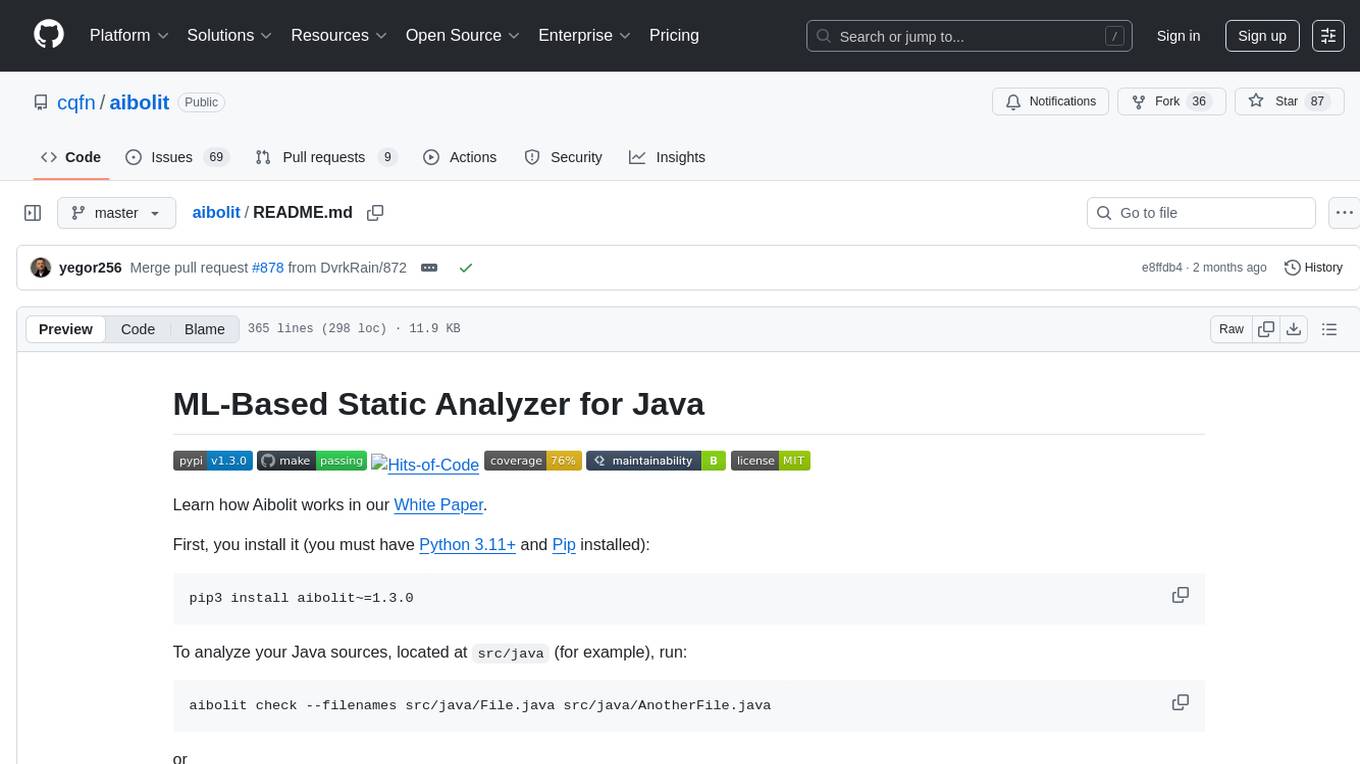
aibolit
Aibolit is a machine learning-based static analyzer for Java that helps identify patterns contributing to Cyclomatic Complexity in Java source code. It provides recommendations for fixing identified issues and allows users to suppress certain patterns. Aibolit can analyze individual Java files or entire folders of Java source code. Users can customize the output format and exclude specific files from analysis. The tool also supports training custom models for analyzing Java code. Aibolit is designed to help developers improve code quality and maintainability by identifying and addressing potential issues in Java code.
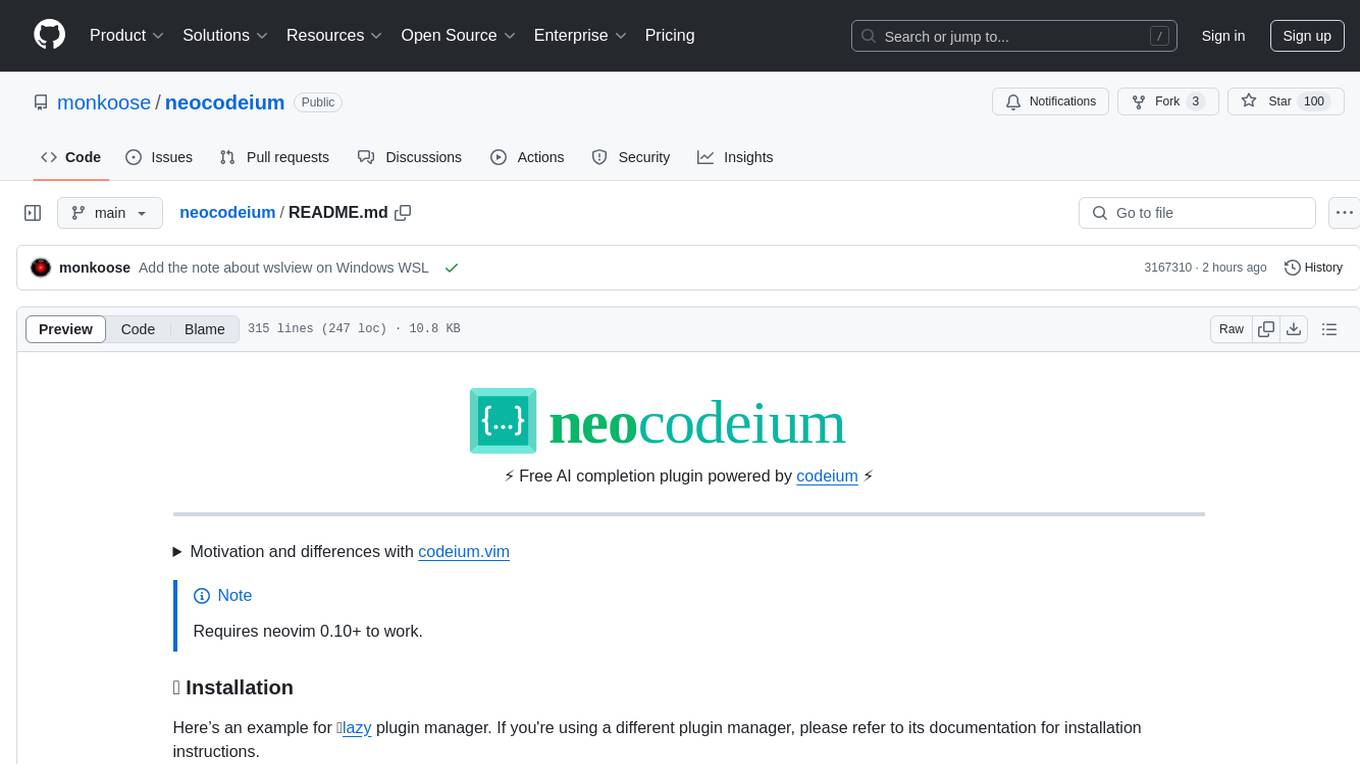
neocodeium
NeoCodeium is a free AI completion plugin powered by Codeium, designed for Neovim users. It aims to provide a smoother experience by eliminating flickering suggestions and allowing for repeatable completions using the `.` key. The plugin offers performance improvements through cache techniques, displays suggestion count labels, and supports Lua scripting. Users can customize keymaps, manage suggestions, and interact with the AI chat feature. NeoCodeium enhances code completion in Neovim, making it a valuable tool for developers seeking efficient coding assistance.
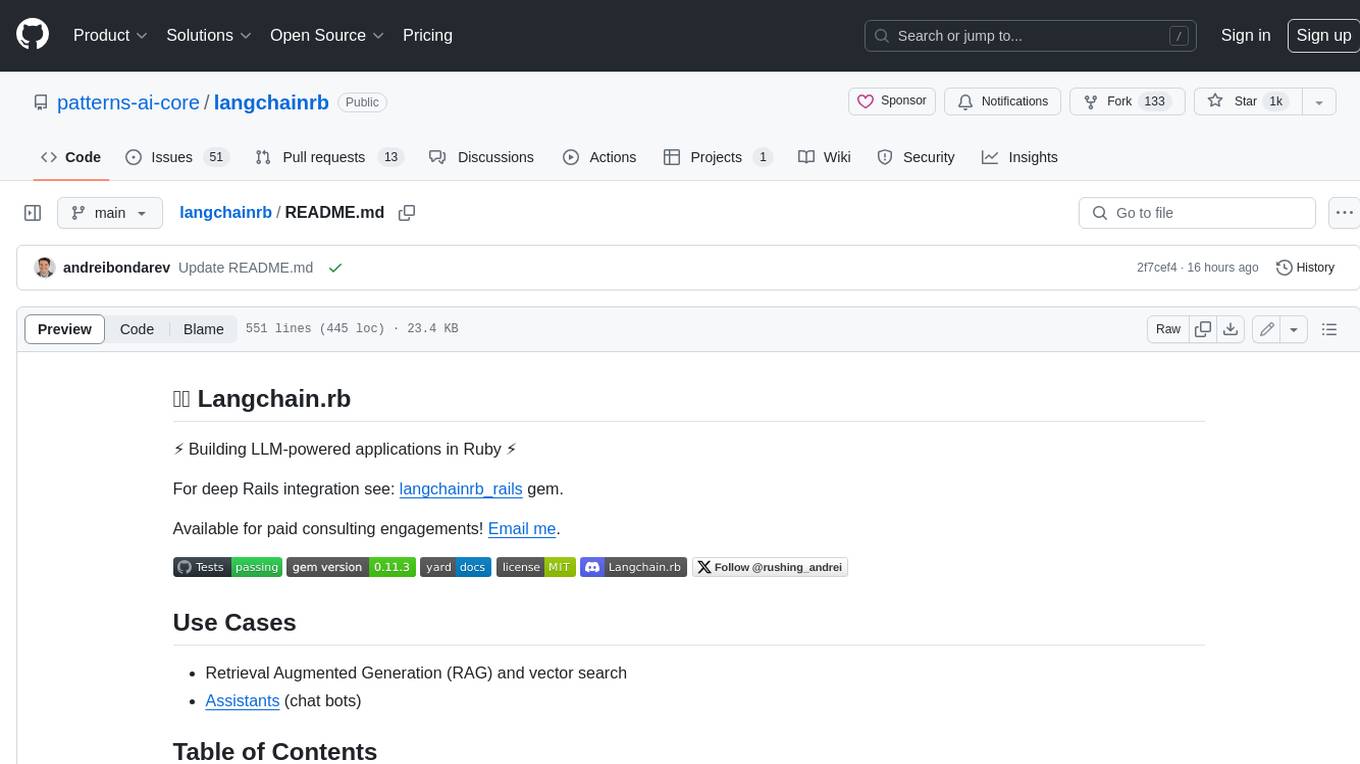
langchainrb
Langchain.rb is a Ruby library that makes it easy to build LLM-powered applications. It provides a unified interface to a variety of LLMs, vector search databases, and other tools, making it easy to build and deploy RAG (Retrieval Augmented Generation) systems and assistants. Langchain.rb is open source and available under the MIT License.
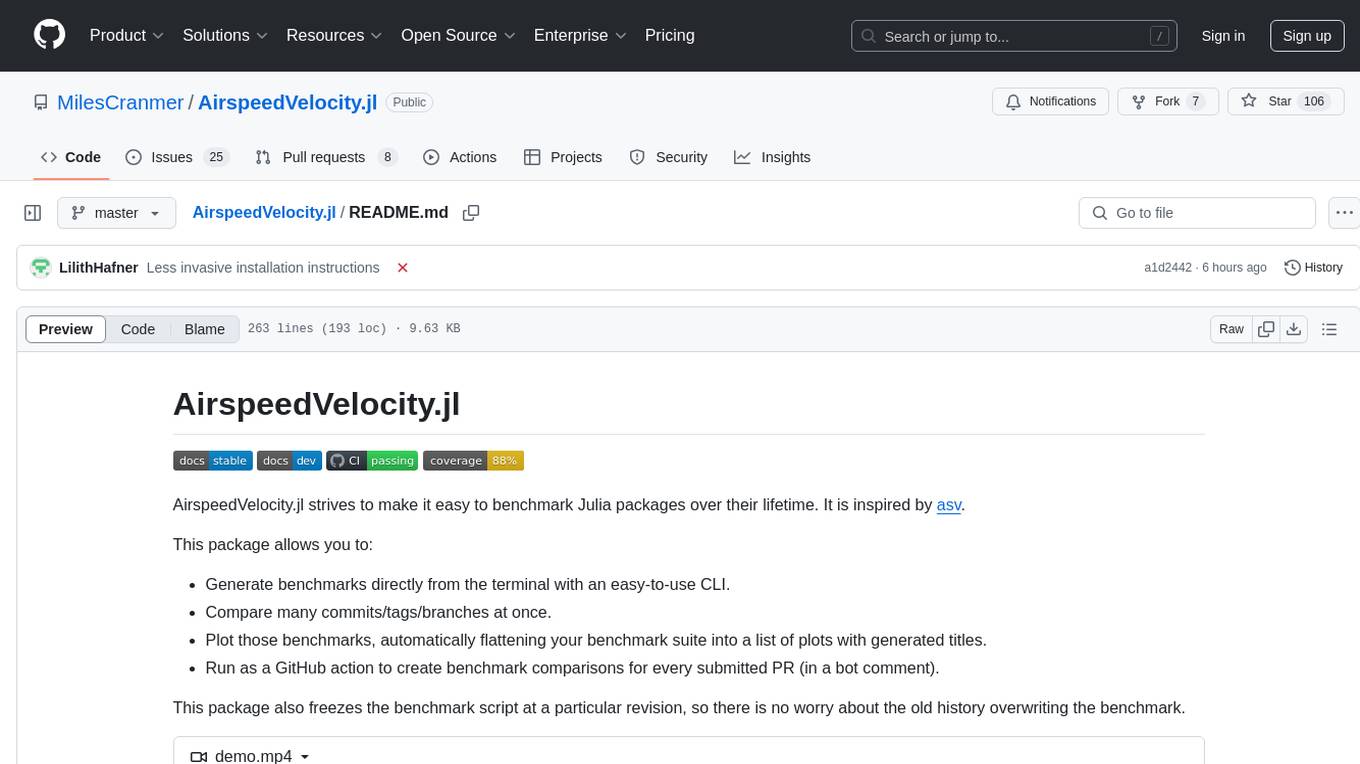
AirspeedVelocity.jl
AirspeedVelocity.jl is a tool designed to simplify benchmarking of Julia packages over their lifetime. It provides a CLI to generate benchmarks, compare commits/tags/branches, plot benchmarks, and run benchmark comparisons for every submitted PR as a GitHub action. The tool freezes the benchmark script at a specific revision to prevent old history from affecting benchmarks. Users can configure options using CLI flags and visualize benchmark results. AirspeedVelocity.jl can be used to benchmark any Julia package and offers features like generating tables and plots of benchmark results. It also supports custom benchmarks and can be integrated into GitHub actions for automated benchmarking of PRs.
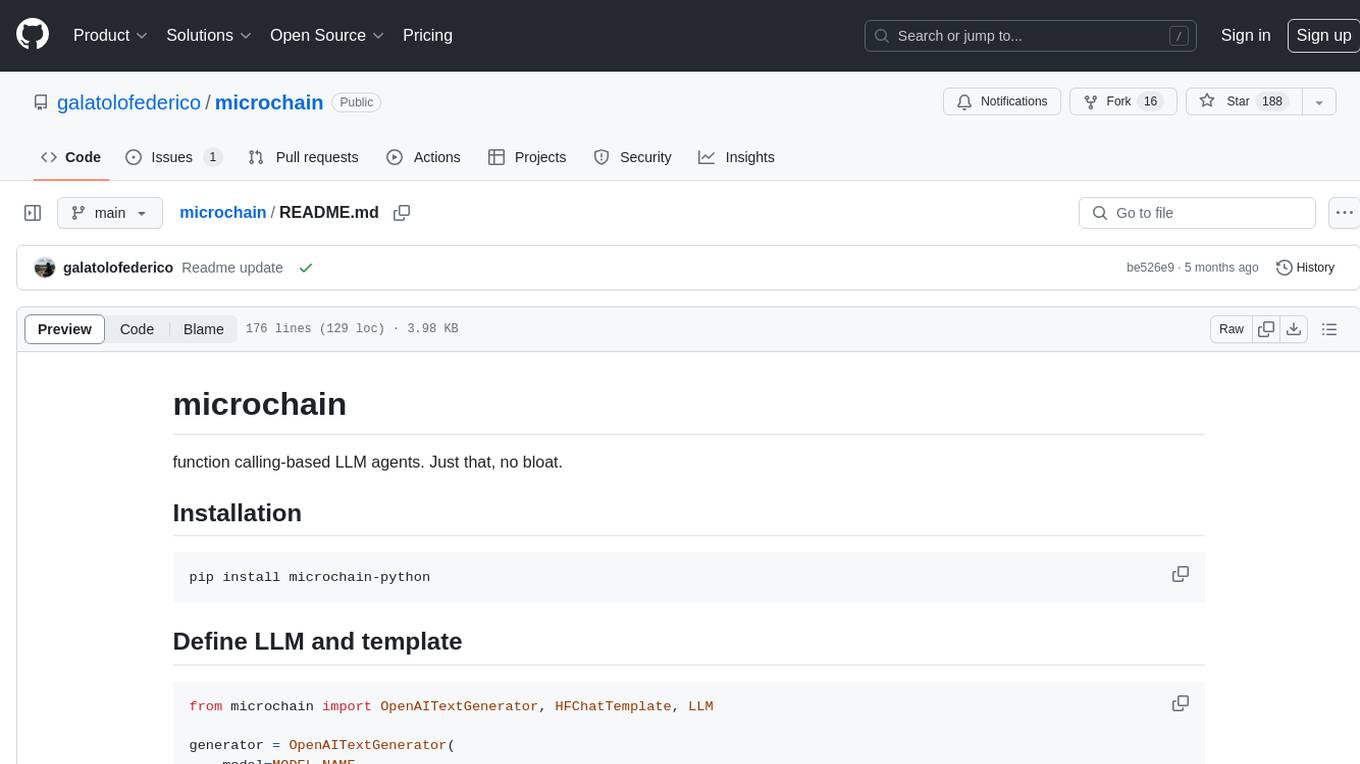
microchain
Microchain is a function calling-based LLM agents tool with no bloat. It allows users to define LLM and templates, use various functions like Sum and Product, and create LLM agents for specific tasks. The tool provides a simple and efficient way to interact with OpenAI models and create conversational agents for various applications.
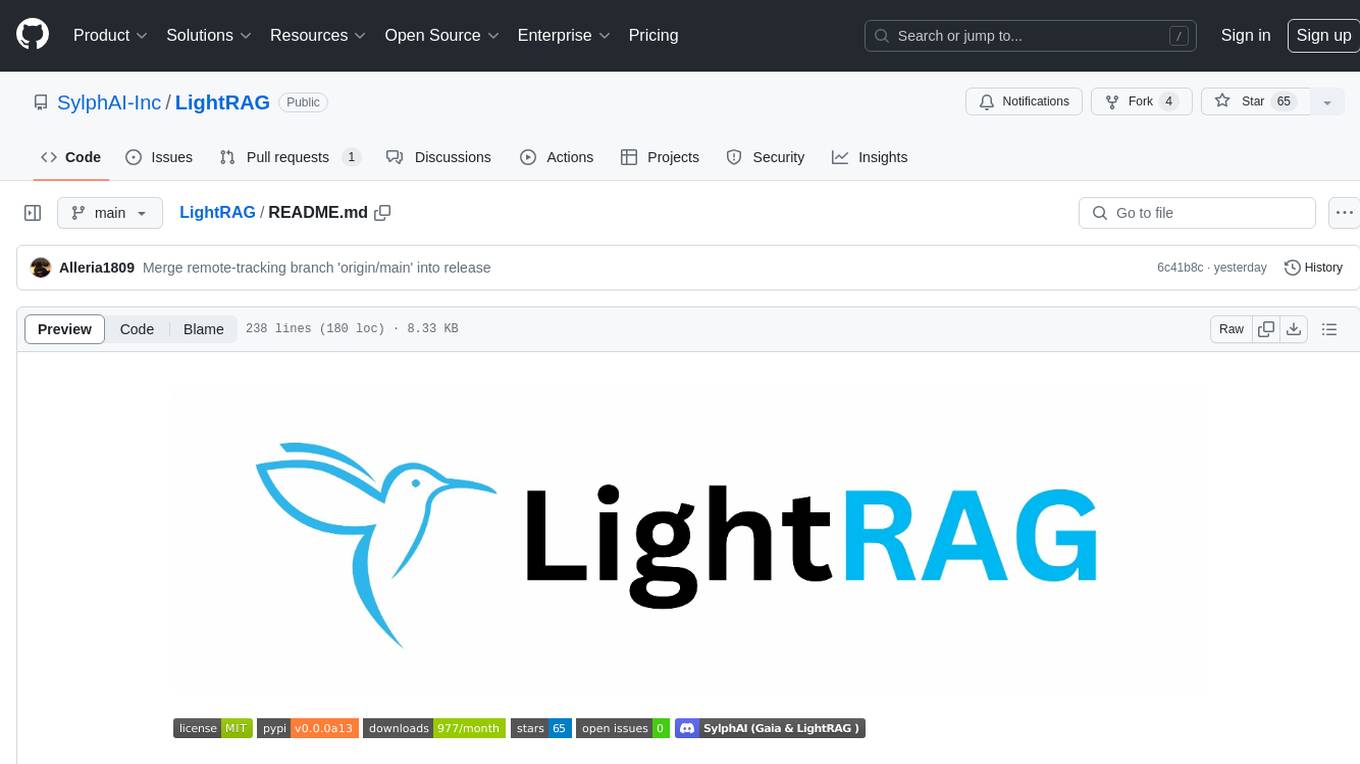
LightRAG
LightRAG is a PyTorch library designed for building and optimizing Retriever-Agent-Generator (RAG) pipelines. It follows principles of simplicity, quality, and optimization, offering developers maximum customizability with minimal abstraction. The library includes components for model interaction, output parsing, and structured data generation. LightRAG facilitates tasks like providing explanations and examples for concepts through a question-answering pipeline.
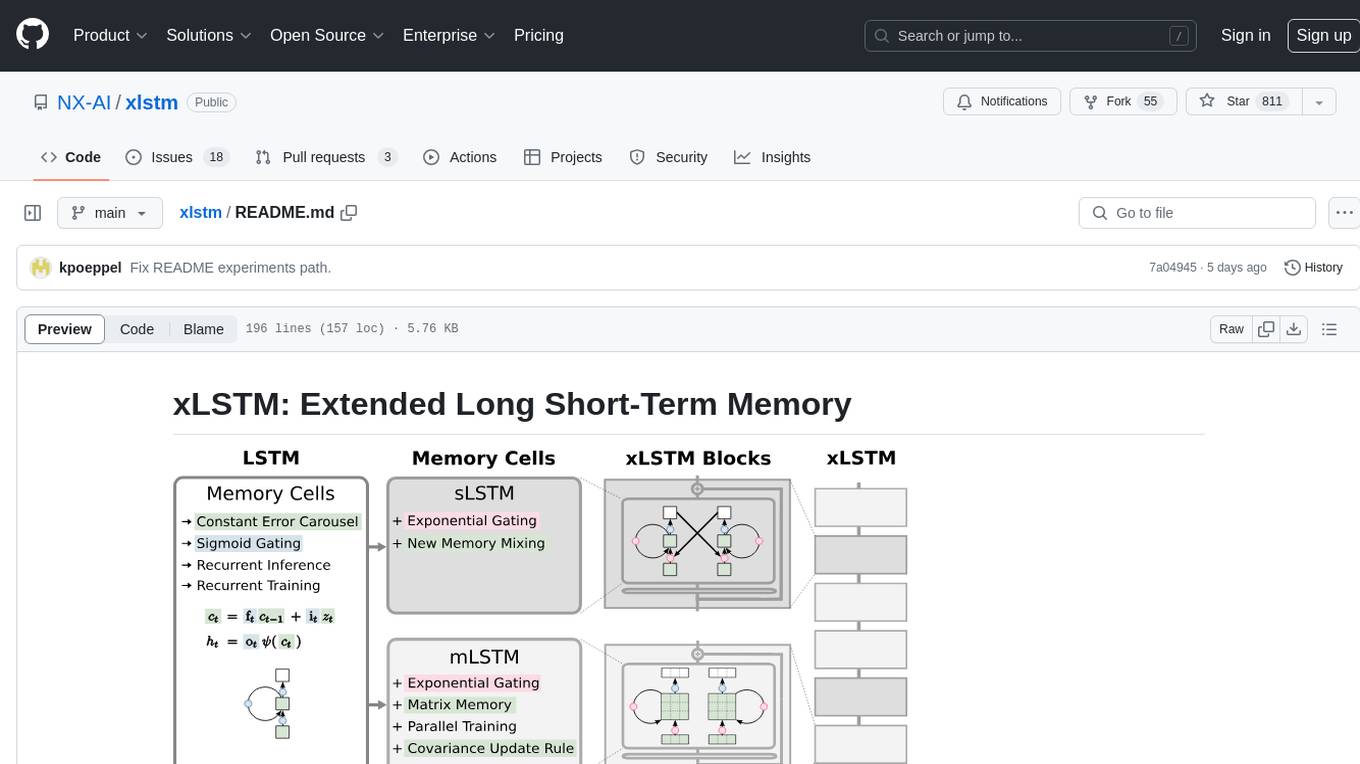
xlstm
xLSTM is a new Recurrent Neural Network architecture based on ideas of the original LSTM. Through Exponential Gating with appropriate normalization and stabilization techniques and a new Matrix Memory it overcomes the limitations of the original LSTM and shows promising performance on Language Modeling when compared to Transformers or State Space Models. The package is based on PyTorch and was tested for versions >=1.8. For the CUDA version of xLSTM, you need Compute Capability >= 8.0. The xLSTM tool provides two main components: xLSTMBlockStack for non-language applications or integrating in other architectures, and xLSTMLMModel for language modeling or other token-based applications.
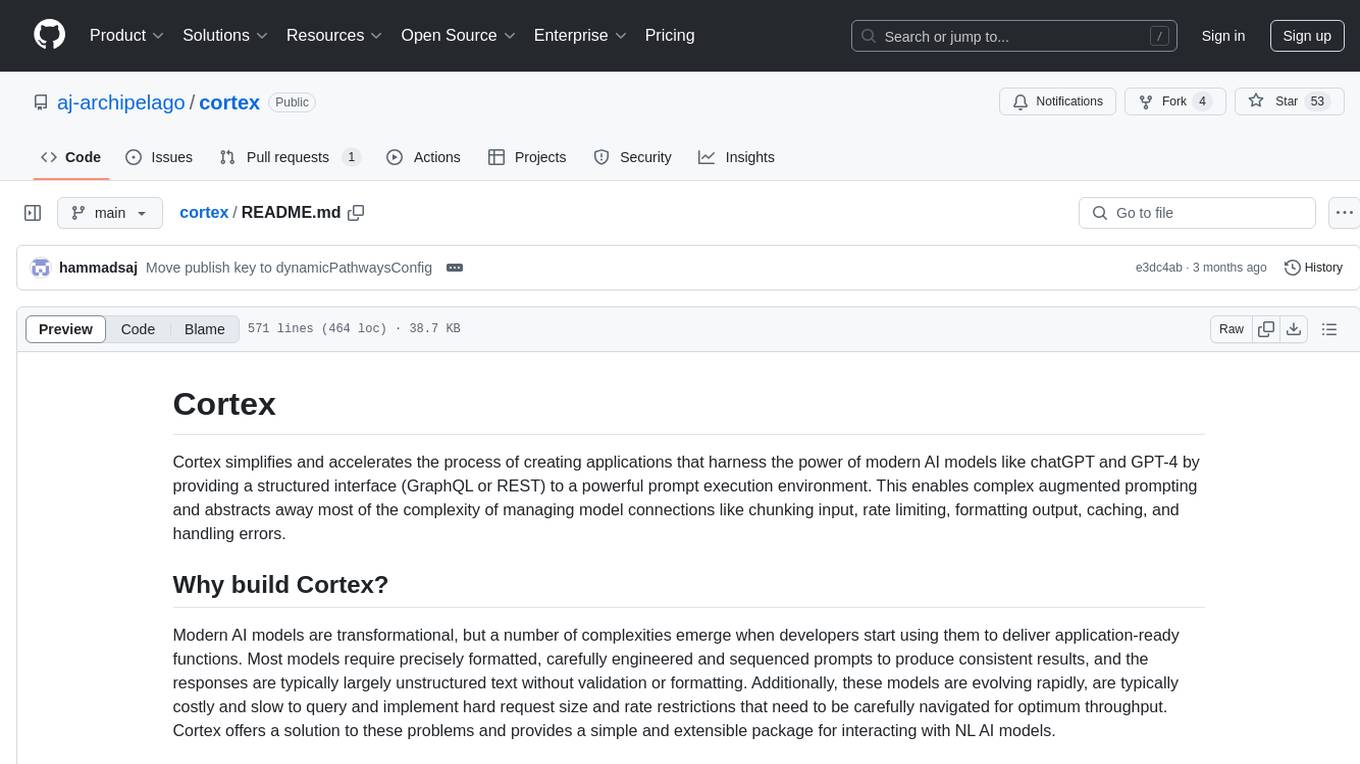
cortex
Cortex is a tool that simplifies and accelerates the process of creating applications utilizing modern AI models like chatGPT and GPT-4. It provides a structured interface (GraphQL or REST) to a prompt execution environment, enabling complex augmented prompting and abstracting away model connection complexities like input chunking, rate limiting, output formatting, caching, and error handling. Cortex offers a solution to challenges faced when using AI models, providing a simple package for interacting with NL AI models.
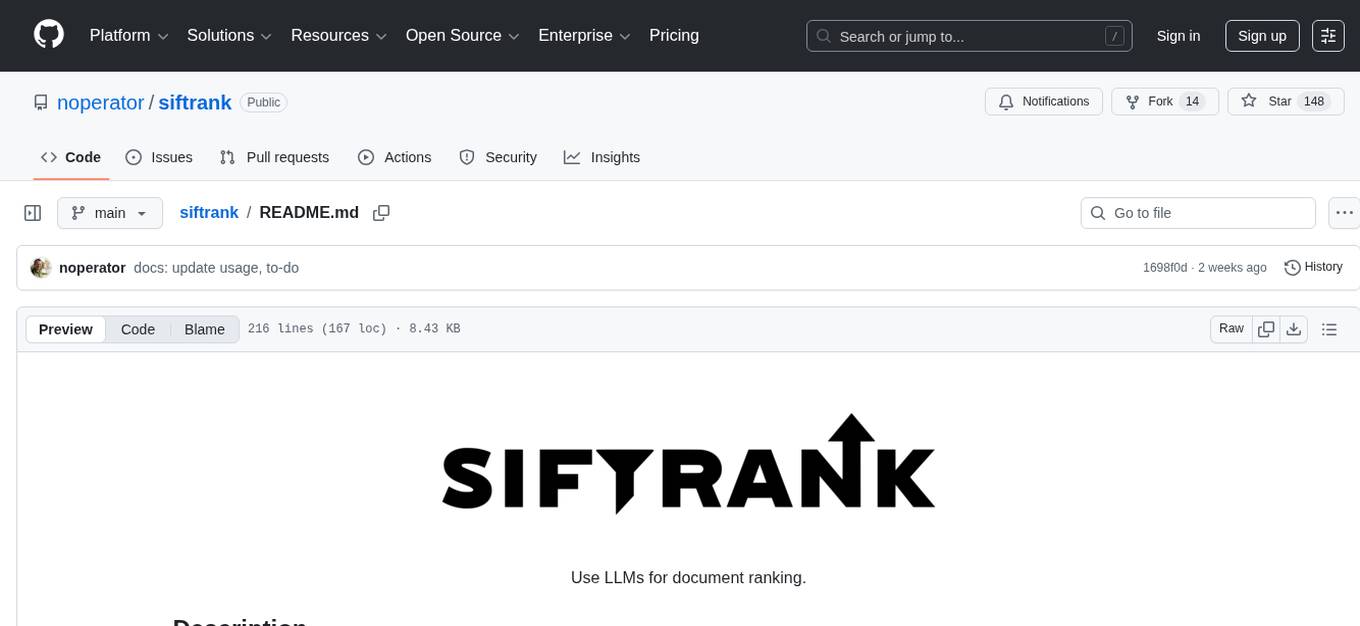
siftrank
siftrank is an implementation of the Sift Rank document ranking algorithm that uses Large Language Models (LLMs) to efficiently find the most relevant items in any dataset based on a given prompt. It addresses issues like non-determinism, limited context, output constraints, and scoring subjectivity encountered when using LLMs directly. siftrank allows users to rank anything without fine-tuning or domain-specific models, running in seconds and costing pennies. It supports JSON input, Go template syntax for customization, and various advanced options for configuration and optimization.

lollms
LoLLMs Server is a text generation server based on large language models. It provides a Flask-based API for generating text using various pre-trained language models. This server is designed to be easy to install and use, allowing developers to integrate powerful text generation capabilities into their applications.
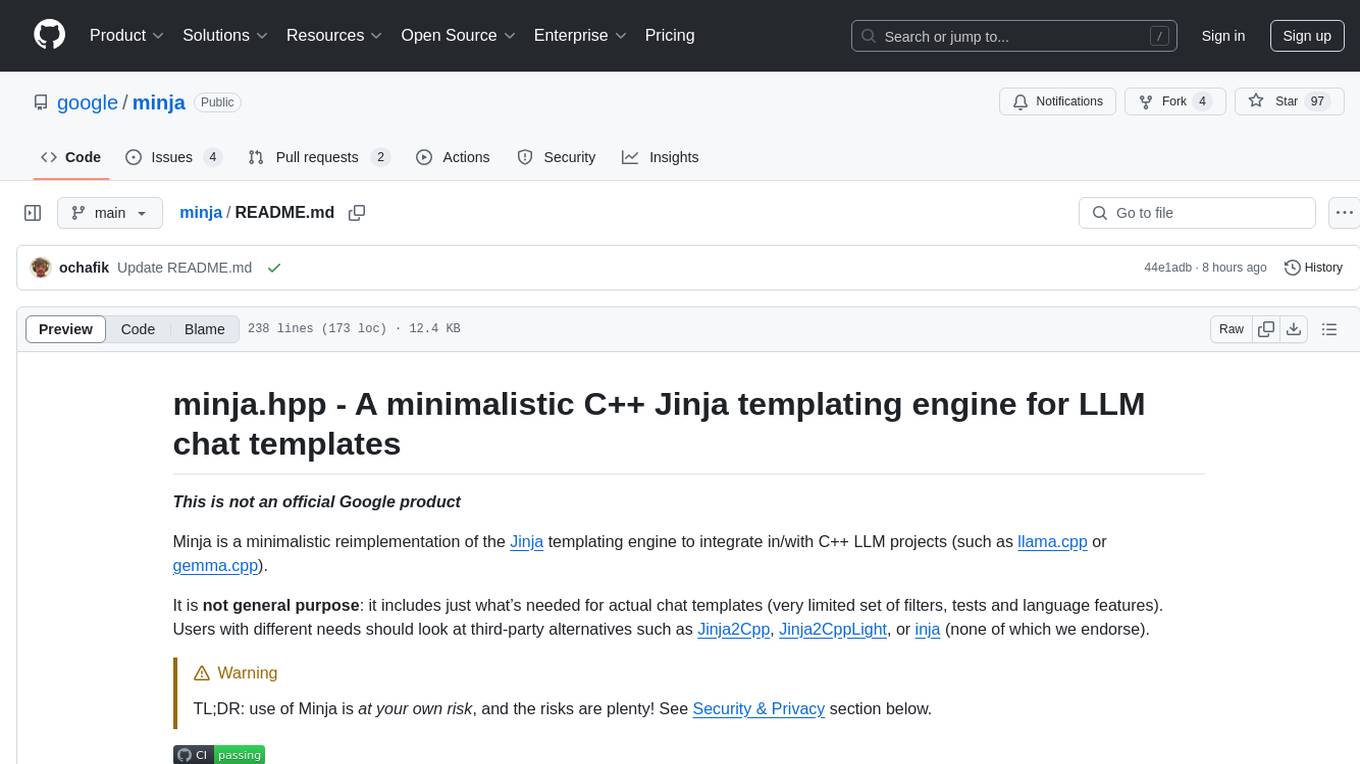
minja
Minja is a minimalistic C++ Jinja templating engine designed specifically for integration with C++ LLM projects, such as llama.cpp or gemma.cpp. It is not a general-purpose tool but focuses on providing a limited set of filters, tests, and language features tailored for chat templates. The library is header-only, requires C++17, and depends only on nlohmann::json. Minja aims to keep the codebase small, easy to understand, and offers decent performance compared to Python. Users should be cautious when using Minja due to potential security risks, and it is not intended for producing HTML or JavaScript output.
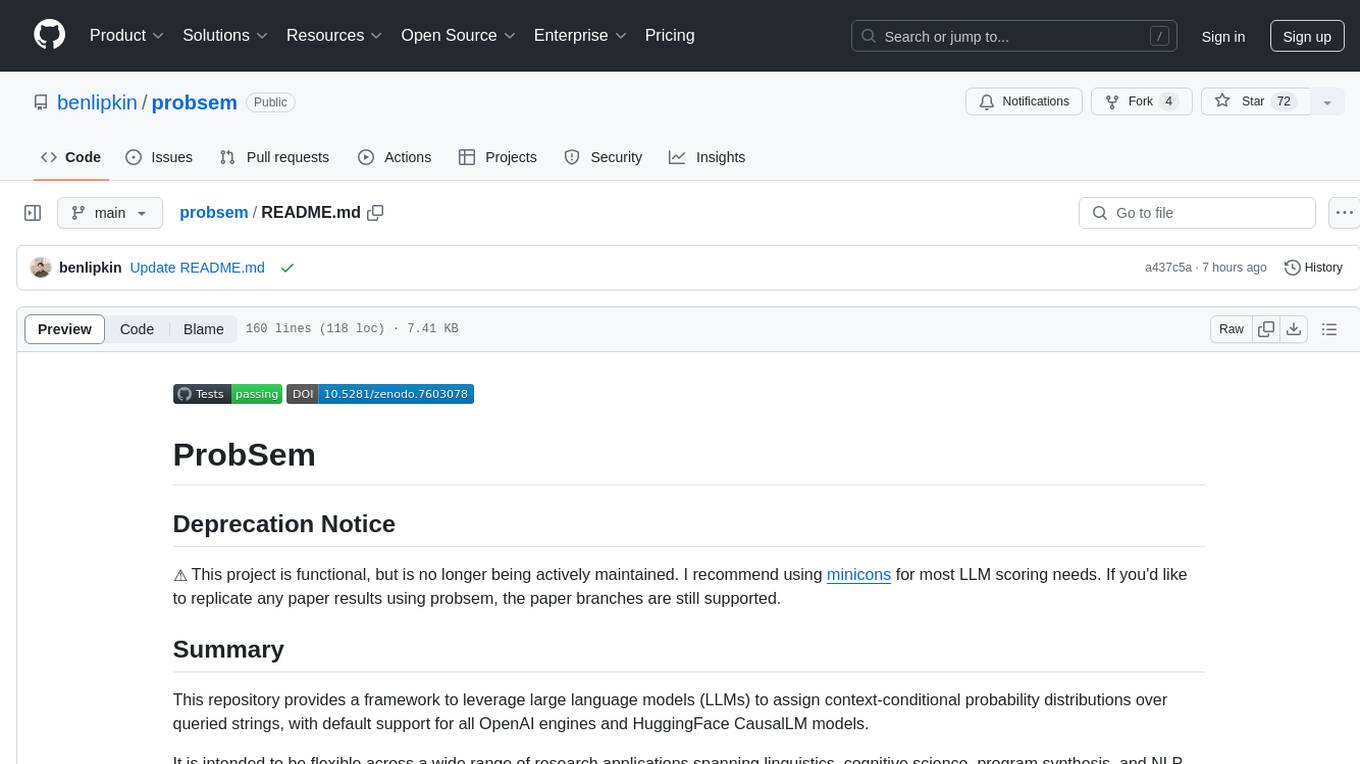
probsem
ProbSem is a repository that provides a framework to leverage large language models (LLMs) for assigning context-conditional probability distributions over queried strings. It supports OpenAI engines and HuggingFace CausalLM models, and is flexible for research applications in linguistics, cognitive science, program synthesis, and NLP. Users can define prompts, contexts, and queries to derive probability distributions over possible completions, enabling tasks like cloze completion, multiple-choice QA, semantic parsing, and code completion. The repository offers CLI and API interfaces for evaluation, with options to customize models, normalize scores, and adjust temperature for probability distributions.
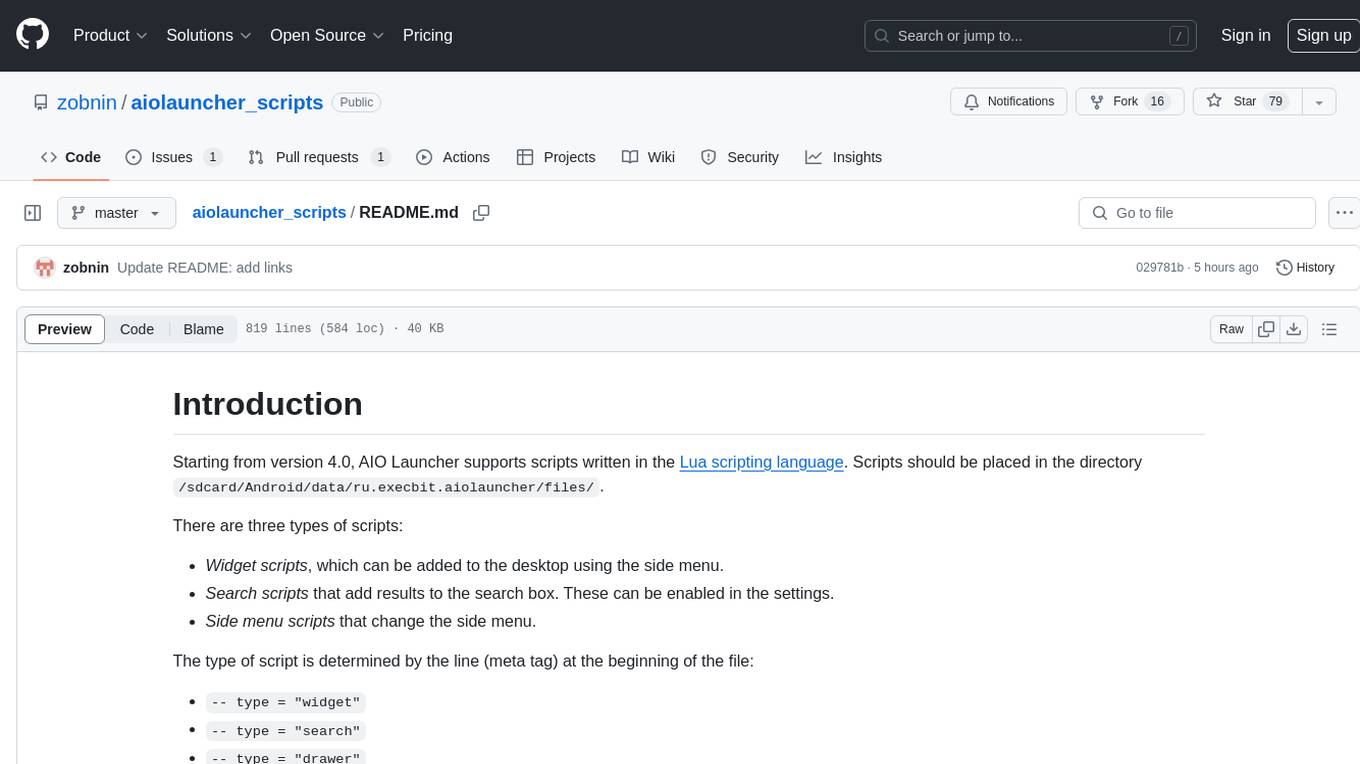
aiolauncher_scripts
AIO Launcher Scripts is a collection of Lua scripts that can be used with AIO Launcher to enhance its functionality. These scripts can be used to create widget scripts, search scripts, and side menu scripts. They provide various functions such as displaying text, buttons, progress bars, charts, and interacting with app widgets. The scripts can be used to customize the appearance and behavior of the launcher, add new features, and interact with external services.
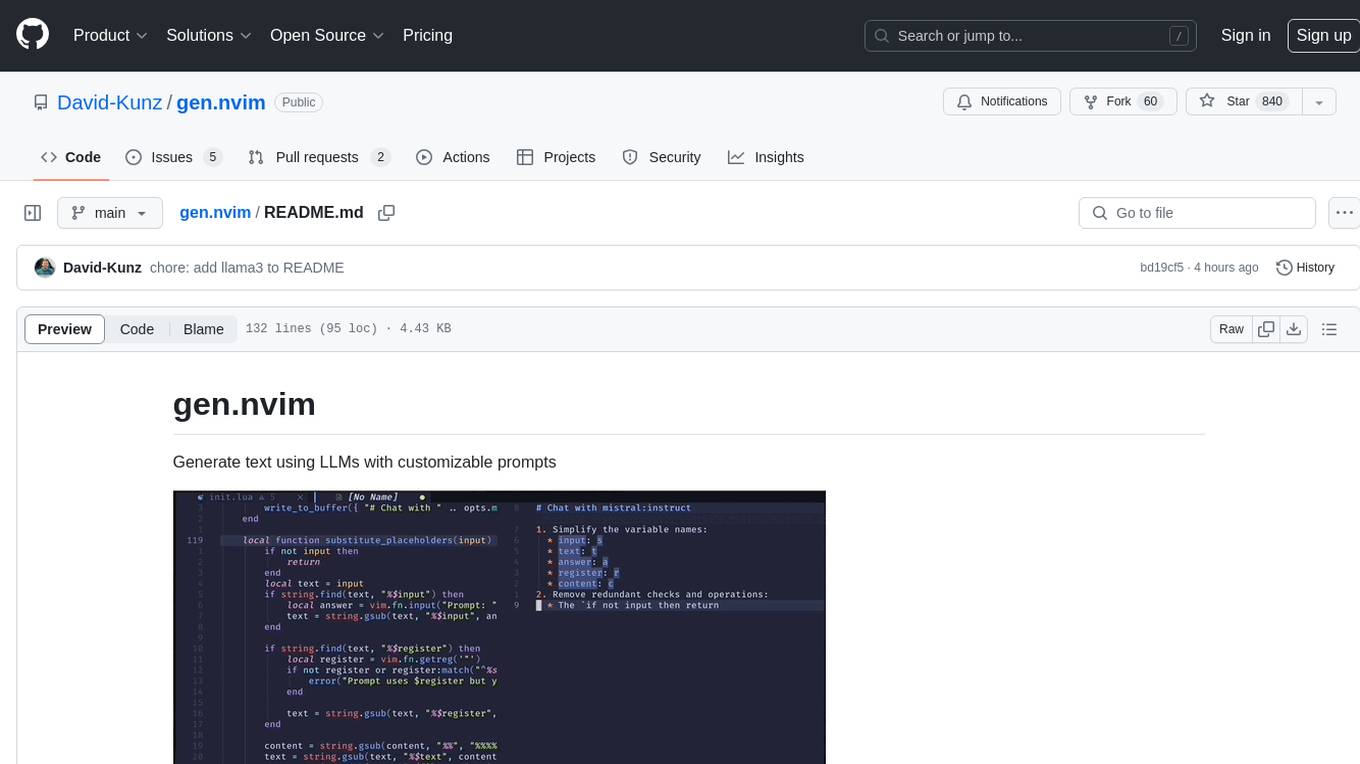
gen.nvim
gen.nvim is a tool that allows users to generate text using Language Models (LLMs) with customizable prompts. It requires Ollama with models like `llama3`, `mistral`, or `zephyr`, along with Curl for installation. Users can use the `Gen` command to generate text based on predefined or custom prompts. The tool provides key maps for easy invocation and allows for follow-up questions during conversations. Additionally, users can select a model from a list of installed models and customize prompts as needed.
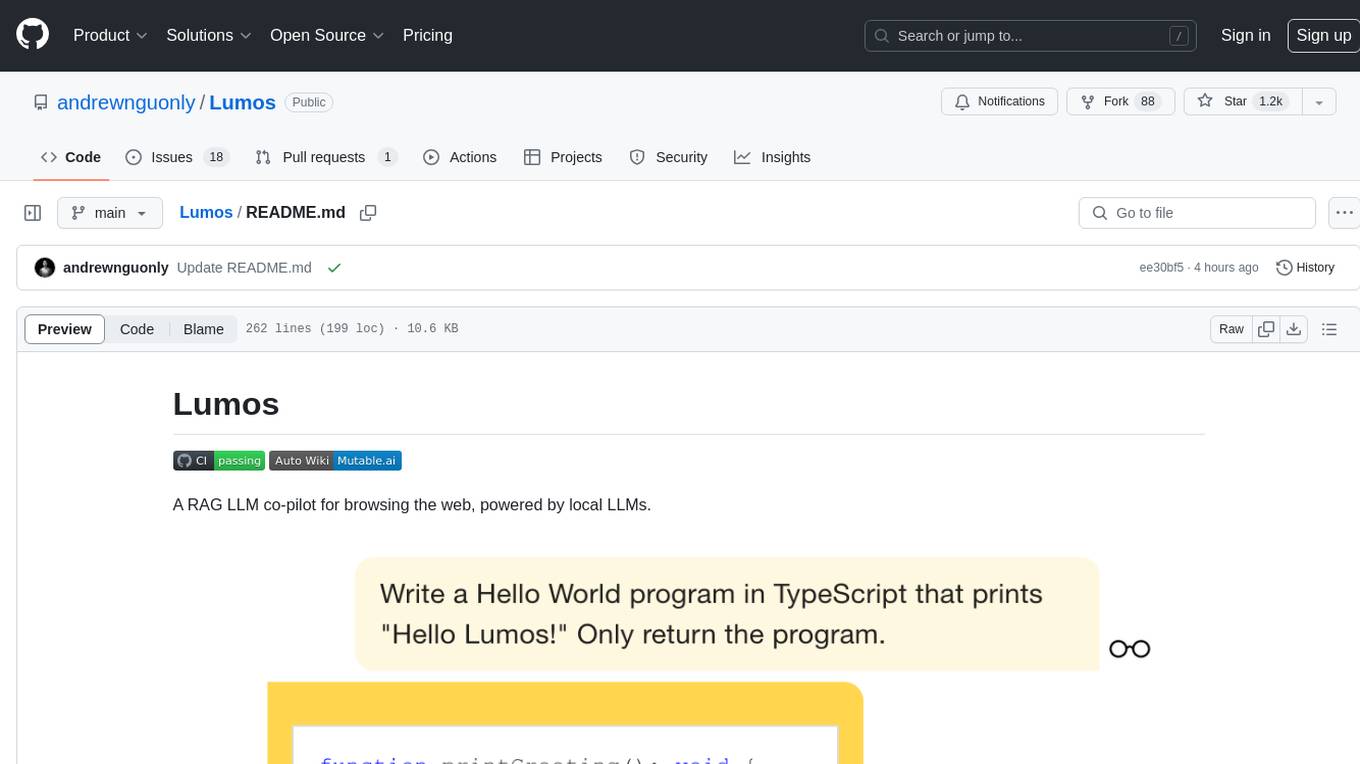
Lumos
Lumos is a Chrome extension powered by a local LLM co-pilot for browsing the web. It allows users to summarize long threads, news articles, and technical documentation. Users can ask questions about reviews and product pages. The tool requires a local Ollama server for LLM inference and embedding database. Lumos supports multimodal models and file attachments for processing text and image content. It also provides options to customize models, hosts, and content parsers. The extension can be easily accessed through keyboard shortcuts and offers tools for automatic invocation based on prompts.
For similar tasks
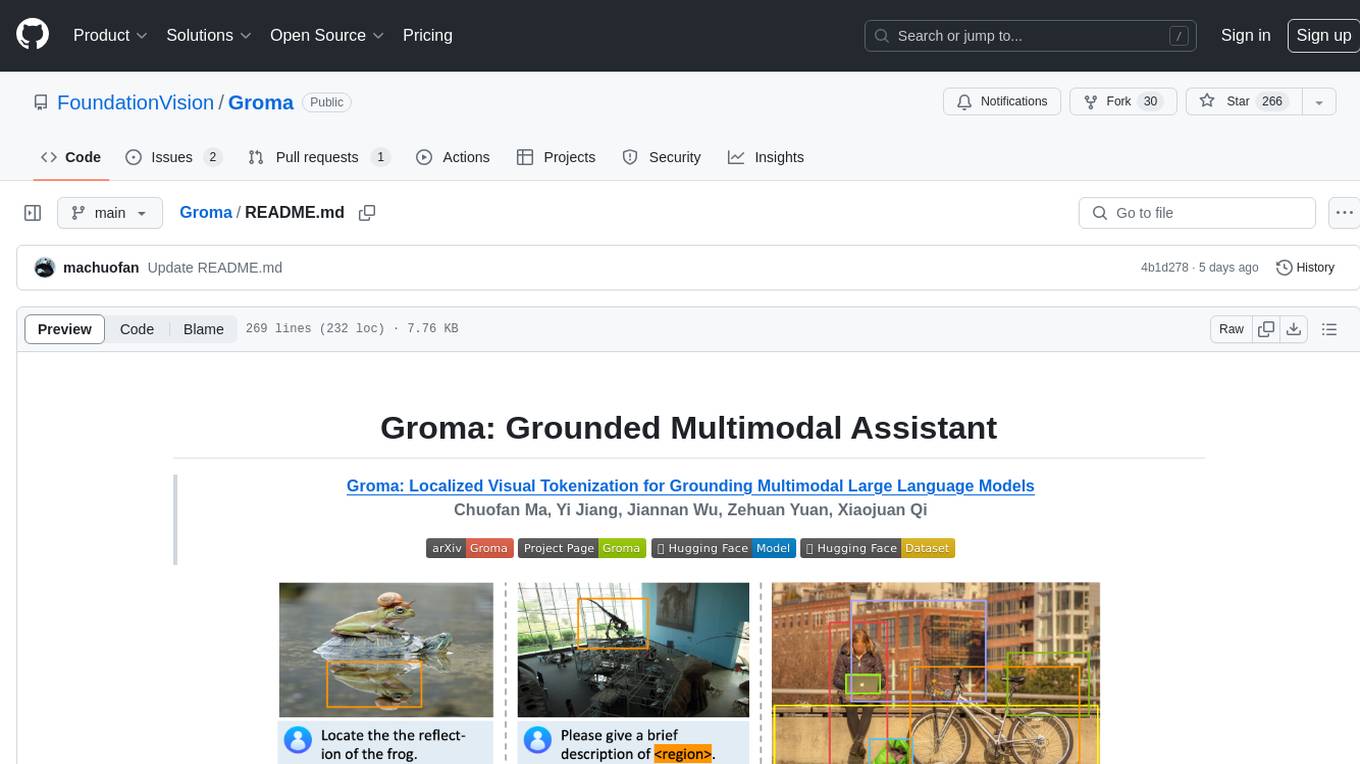
Groma
Groma is a grounded multimodal assistant that excels in region understanding and visual grounding. It can process user-defined region inputs and generate contextually grounded long-form responses. The tool presents a unique paradigm for multimodal large language models, focusing on visual tokenization for localization. Groma achieves state-of-the-art performance in referring expression comprehension benchmarks. The tool provides pretrained model weights and instructions for data preparation, training, inference, and evaluation. Users can customize training by starting from intermediate checkpoints. Groma is designed to handle tasks related to detection pretraining, alignment pretraining, instruction finetuning, instruction following, and more.

fastfit
FastFit is a Python package designed for fast and accurate few-shot classification, especially for scenarios with many semantically similar classes. It utilizes a novel approach integrating batch contrastive learning and token-level similarity score, significantly improving multi-class classification performance in speed and accuracy across various datasets. FastFit provides a convenient command-line tool for training text classification models with customizable parameters. It offers a 3-20x improvement in training speed, completing training in just a few seconds. Users can also train models with Python scripts and perform inference using pretrained models for text classification tasks.
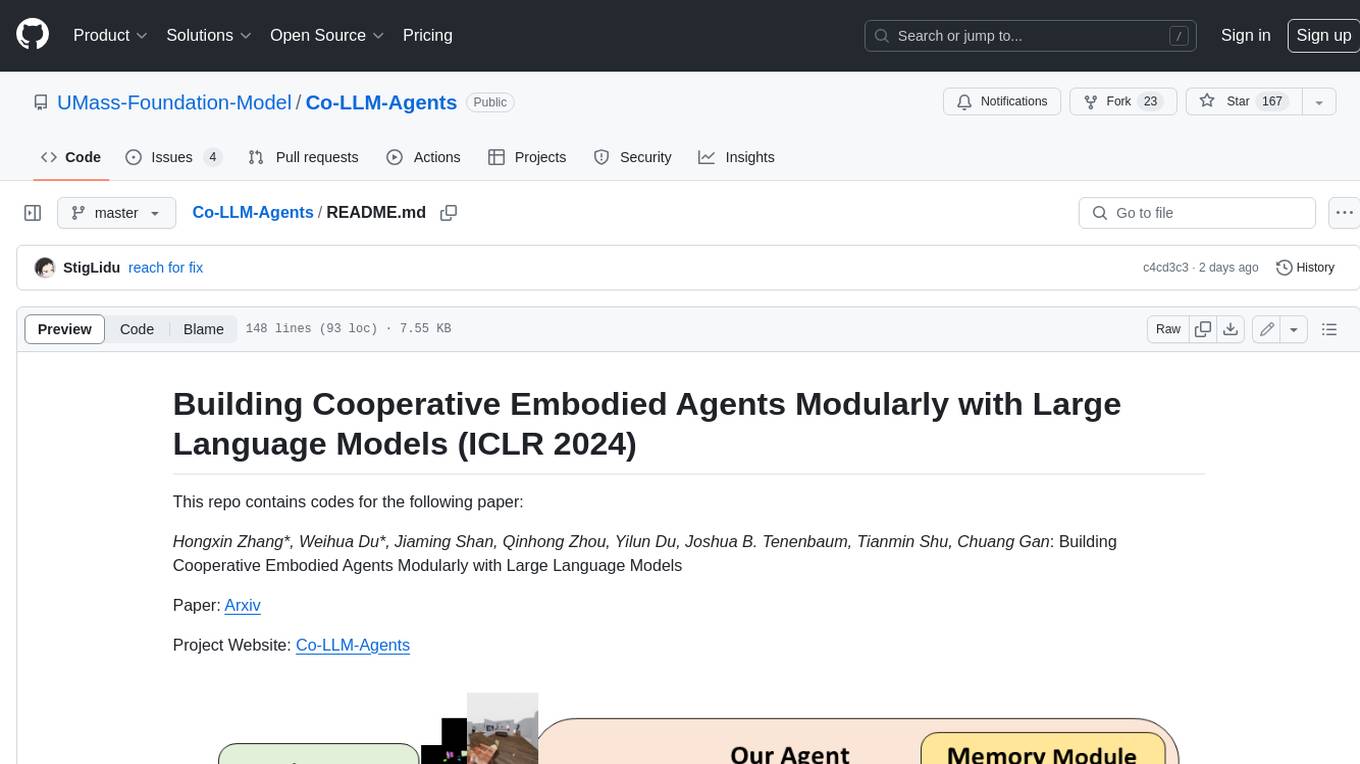
Co-LLM-Agents
This repository contains code for building cooperative embodied agents modularly with large language models. The agents are trained to perform tasks in two different environments: ThreeDWorld Multi-Agent Transport (TDW-MAT) and Communicative Watch-And-Help (C-WAH). TDW-MAT is a multi-agent environment where agents must transport objects to a goal position using containers. C-WAH is an extension of the Watch-And-Help challenge, which enables agents to send messages to each other. The code in this repository can be used to train agents to perform tasks in both of these environments.
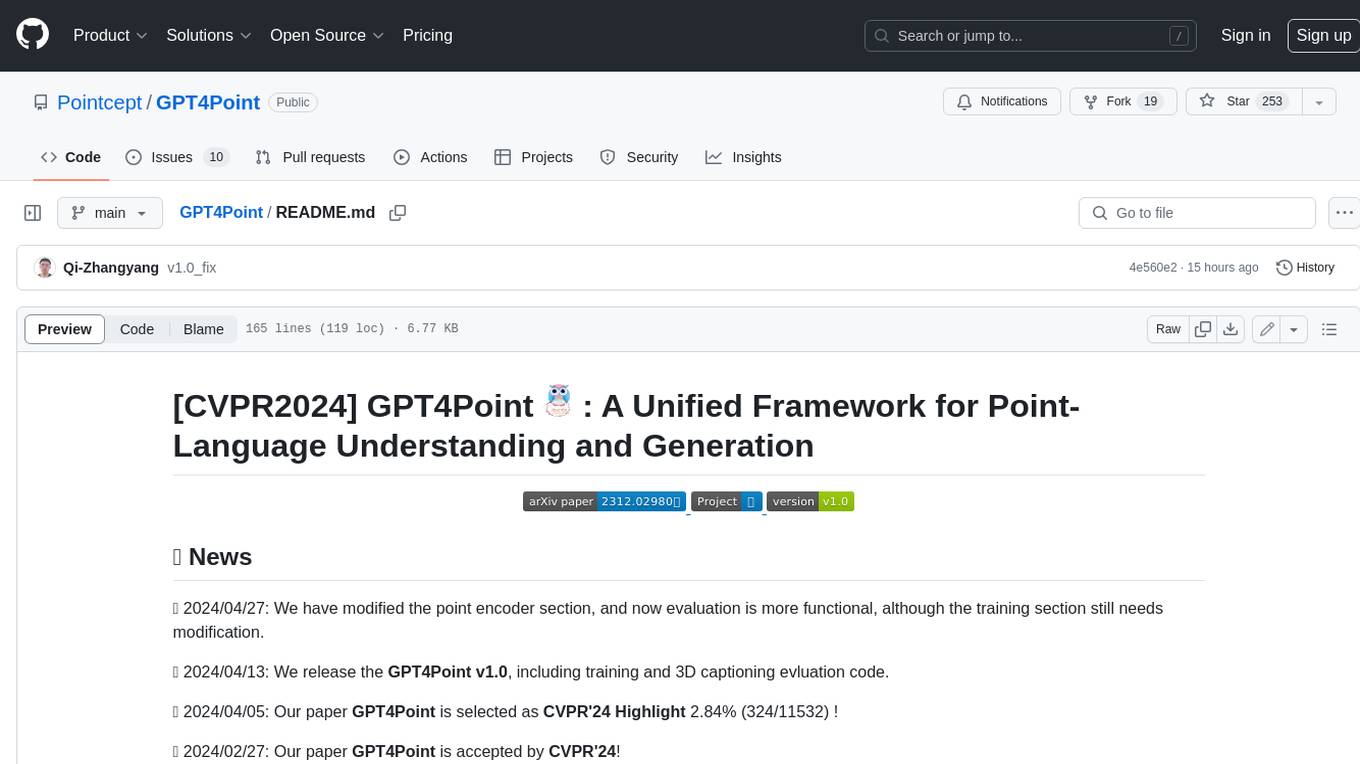
GPT4Point
GPT4Point is a unified framework for point-language understanding and generation. It aligns 3D point clouds with language, providing a comprehensive solution for tasks such as 3D captioning and controlled 3D generation. The project includes an automated point-language dataset annotation engine, a novel object-level point cloud benchmark, and a 3D multi-modality model. Users can train and evaluate models using the provided code and datasets, with a focus on improving models' understanding capabilities and facilitating the generation of 3D objects.
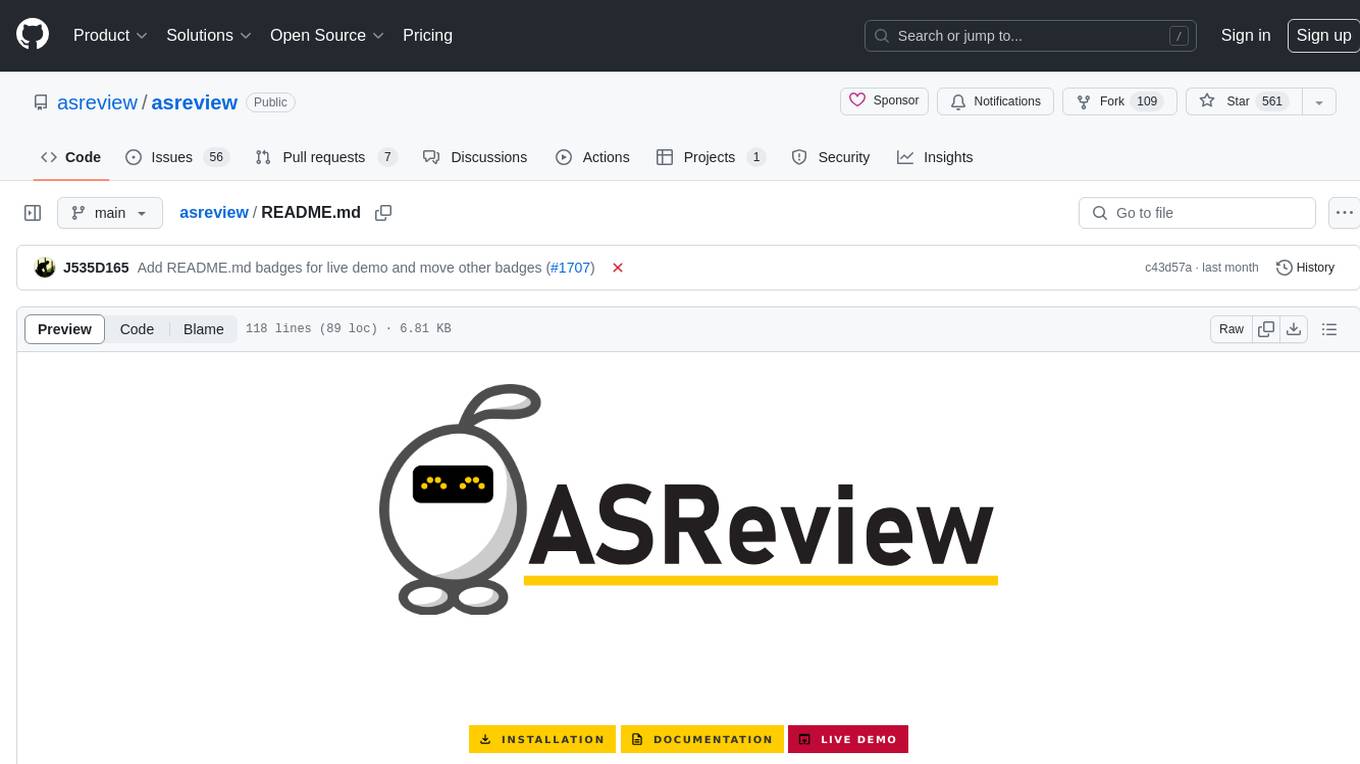
asreview
The ASReview project implements active learning for systematic reviews, utilizing AI-aided pipelines to assist in finding relevant texts for search tasks. It accelerates the screening of textual data with minimal human input, saving time and increasing output quality. The software offers three modes: Oracle for interactive screening, Exploration for teaching purposes, and Simulation for evaluating active learning models. ASReview LAB is designed to support decision-making in any discipline or industry by improving efficiency and transparency in screening large amounts of textual data.
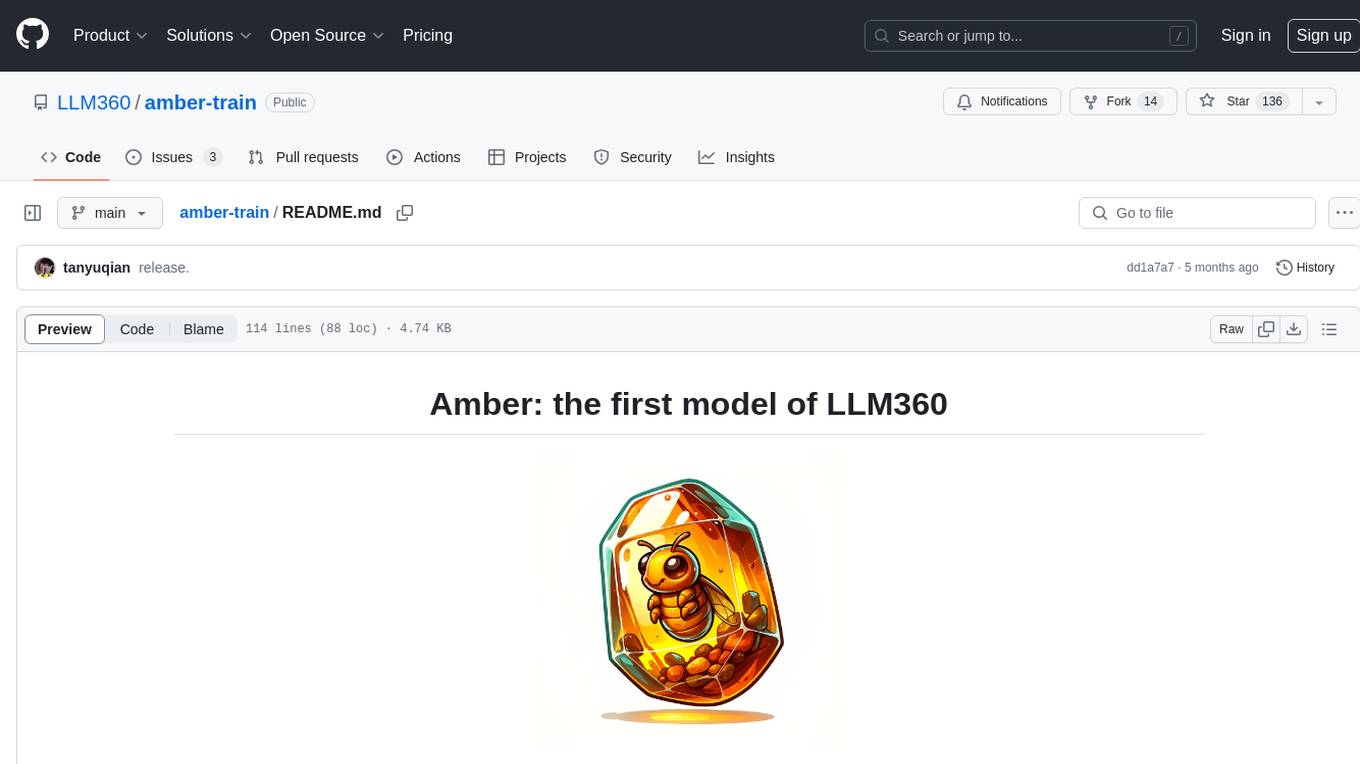
amber-train
Amber is the first model in the LLM360 family, an initiative for comprehensive and fully open-sourced LLMs. It is a 7B English language model with the LLaMA architecture. The model type is a language model with the same architecture as LLaMA-7B. It is licensed under Apache 2.0. The resources available include training code, data preparation, metrics, and fully processed Amber pretraining data. The model has been trained on various datasets like Arxiv, Book, C4, Refined-Web, StarCoder, StackExchange, and Wikipedia. The hyperparameters include a total of 6.7B parameters, hidden size of 4096, intermediate size of 11008, 32 attention heads, 32 hidden layers, RMSNorm ε of 1e^-6, max sequence length of 2048, and a vocabulary size of 32000.
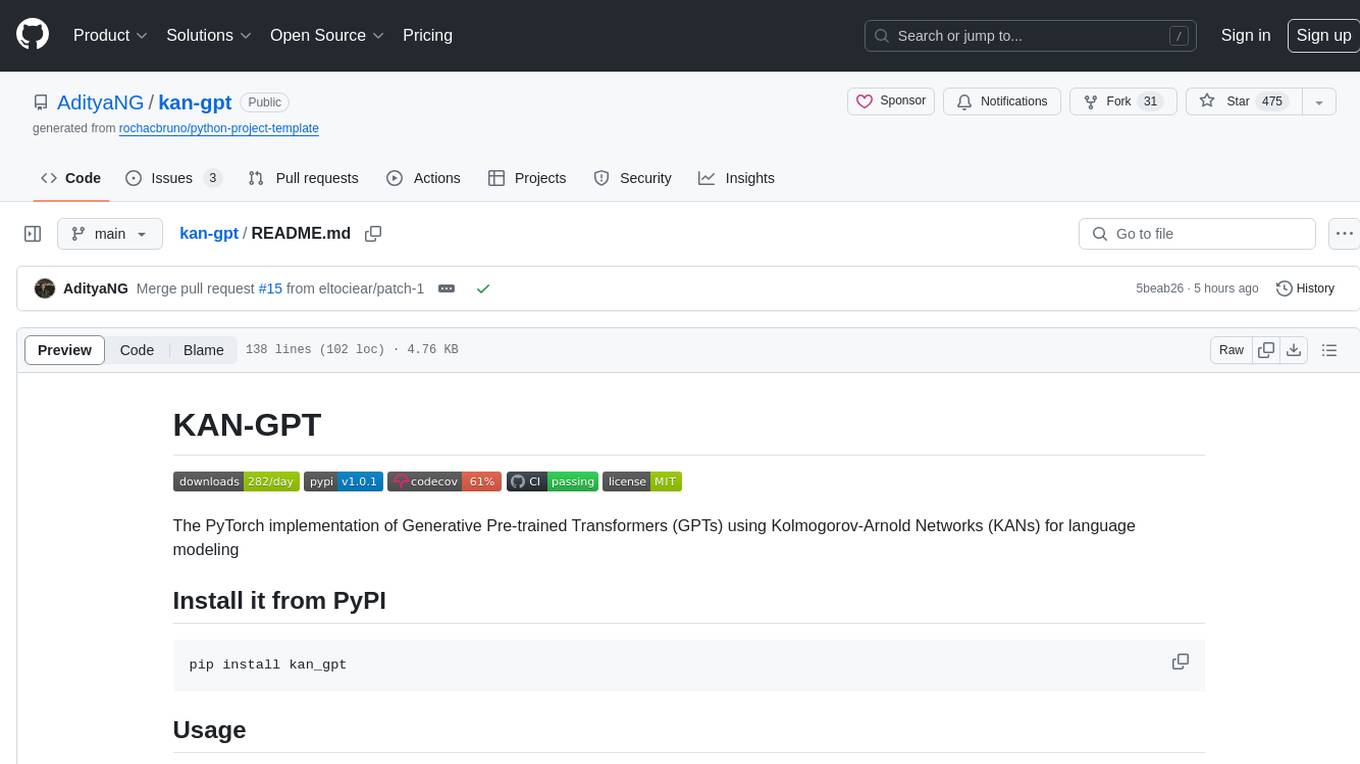
kan-gpt
The KAN-GPT repository is a PyTorch implementation of Generative Pre-trained Transformers (GPTs) using Kolmogorov-Arnold Networks (KANs) for language modeling. It provides a model for generating text based on prompts, with a focus on improving performance compared to traditional MLP-GPT models. The repository includes scripts for training the model, downloading datasets, and evaluating model performance. Development tasks include integrating with other libraries, testing, and documentation.
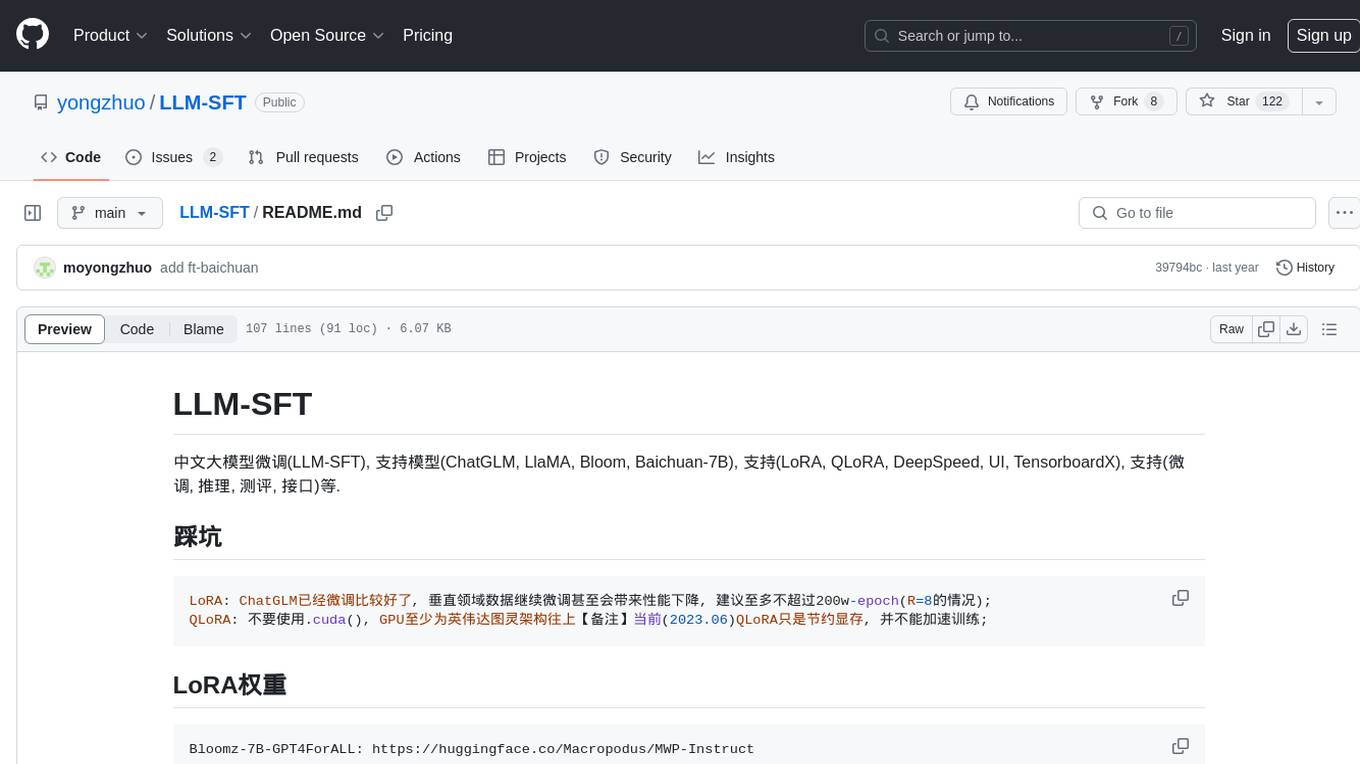
LLM-SFT
LLM-SFT is a Chinese large model fine-tuning tool that supports models such as ChatGLM, LlaMA, Bloom, Baichuan-7B, and frameworks like LoRA, QLoRA, DeepSpeed, UI, and TensorboardX. It facilitates tasks like fine-tuning, inference, evaluation, and API integration. The tool provides pre-trained weights for various models and datasets for Chinese language processing. It requires specific versions of libraries like transformers and torch for different functionalities.
For similar jobs

sweep
Sweep is an AI junior developer that turns bugs and feature requests into code changes. It automatically handles developer experience improvements like adding type hints and improving test coverage.

teams-ai
The Teams AI Library is a software development kit (SDK) that helps developers create bots that can interact with Teams and Microsoft 365 applications. It is built on top of the Bot Framework SDK and simplifies the process of developing bots that interact with Teams' artificial intelligence capabilities. The SDK is available for JavaScript/TypeScript, .NET, and Python.

ai-guide
This guide is dedicated to Large Language Models (LLMs) that you can run on your home computer. It assumes your PC is a lower-end, non-gaming setup.

classifai
Supercharge WordPress Content Workflows and Engagement with Artificial Intelligence. Tap into leading cloud-based services like OpenAI, Microsoft Azure AI, Google Gemini and IBM Watson to augment your WordPress-powered websites. Publish content faster while improving SEO performance and increasing audience engagement. ClassifAI integrates Artificial Intelligence and Machine Learning technologies to lighten your workload and eliminate tedious tasks, giving you more time to create original content that matters.

chatbot-ui
Chatbot UI is an open-source AI chat app that allows users to create and deploy their own AI chatbots. It is easy to use and can be customized to fit any need. Chatbot UI is perfect for businesses, developers, and anyone who wants to create a chatbot.

BricksLLM
BricksLLM is a cloud native AI gateway written in Go. Currently, it provides native support for OpenAI, Anthropic, Azure OpenAI and vLLM. BricksLLM aims to provide enterprise level infrastructure that can power any LLM production use cases. Here are some use cases for BricksLLM: * Set LLM usage limits for users on different pricing tiers * Track LLM usage on a per user and per organization basis * Block or redact requests containing PIIs * Improve LLM reliability with failovers, retries and caching * Distribute API keys with rate limits and cost limits for internal development/production use cases * Distribute API keys with rate limits and cost limits for students

uAgents
uAgents is a Python library developed by Fetch.ai that allows for the creation of autonomous AI agents. These agents can perform various tasks on a schedule or take action on various events. uAgents are easy to create and manage, and they are connected to a fast-growing network of other uAgents. They are also secure, with cryptographically secured messages and wallets.

griptape
Griptape is a modular Python framework for building AI-powered applications that securely connect to your enterprise data and APIs. It offers developers the ability to maintain control and flexibility at every step. Griptape's core components include Structures (Agents, Pipelines, and Workflows), Tasks, Tools, Memory (Conversation Memory, Task Memory, and Meta Memory), Drivers (Prompt and Embedding Drivers, Vector Store Drivers, Image Generation Drivers, Image Query Drivers, SQL Drivers, Web Scraper Drivers, and Conversation Memory Drivers), Engines (Query Engines, Extraction Engines, Summary Engines, Image Generation Engines, and Image Query Engines), and additional components (Rulesets, Loaders, Artifacts, Chunkers, and Tokenizers). Griptape enables developers to create AI-powered applications with ease and efficiency.